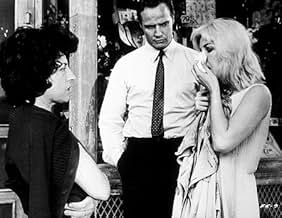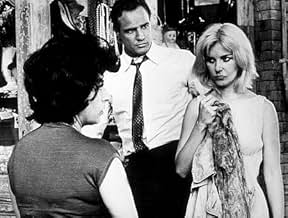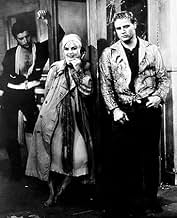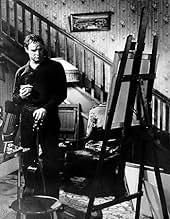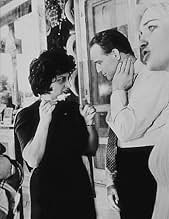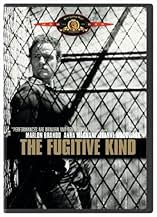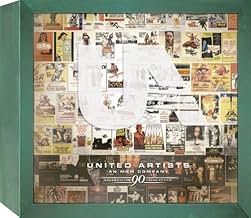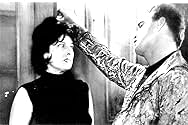IMDb RATING
7.1/10
7.9K
YOUR RATING
A guitar-playing drifter wanders into a small Mississippi town and inflames two troubled women.A guitar-playing drifter wanders into a small Mississippi town and inflames two troubled women.A guitar-playing drifter wanders into a small Mississippi town and inflames two troubled women.
- Awards
- 2 wins total
Madame Spivy
- Ruby Lightfoot
- (as Spivy)
Jeanne Barr
- Bit Part
- (uncredited)
Featured reviews
"Orpheus Descending" may be one of Tennessee Williams' lesser plays but this screen version, under the more commercial title "The Fugitive Kind", is a fairly juicy entertainment. thanks for the most part to the playing of Marlon Brando, Anna Magnani and Joanne Woodward. They are superb and lift the material, which is far from first-rate, to an altogether higher plain. The director was Sidney Lumet and while it may not be the best thing he's ever done, he certainly ensures we are never bored.
Williams himself adapted his play along with Meade Roberts and he signposts all the big moments well in advance. Once you hear Magnani's Lady Torrence tell of how vigilantes burned down her father's orchard with him in it, you know how things will turn out - badly! The superb cinematography, in widescreen and in black and white, is by the great Boris Kaufman and the nice, bluesy score is by Kenyon Hopkins.
Williams himself adapted his play along with Meade Roberts and he signposts all the big moments well in advance. Once you hear Magnani's Lady Torrence tell of how vigilantes burned down her father's orchard with him in it, you know how things will turn out - badly! The superb cinematography, in widescreen and in black and white, is by the great Boris Kaufman and the nice, bluesy score is by Kenyon Hopkins.
Based on the play "Orpheus Descending" by Tennessee Williams directed by Sidney Lumet with an exceptional cast: Marlon Brando, Anna Magnani, Joanne Woodward, Maureen Stapleton and Victor Jory. I saw it for the first time when I was still in my teens and I had an opaque, sticky memory of the film so when somebody suggested to see it on DVD I knew we were in for an opaque, sticky evening but, as it happens, I was dead wrong. "The Fugitive Kind" is riveting with an opening monologue by Brando that is astonishing. A 1960 Brando when he had still, I imagine. hopes to be the actor, the man he wanted to be. There is an animal innocence in his eyes in his moves. The magnificent Magnani, who learned her lines phonetically because she didn't know English presented Brando with a challenge as an actress and as a woman. I hear it wasn't pretty but the result is a feast for the eyes and the ears. The film may not be perfect but I don't think the original material was either so what we got here is a unique opportunity to see this enormous artists giving their whole. That alone makes it a collectors item.
Tennessee Williams was a stunning writer for the theater... The impact of his plays can overwhelm an audience with its superior force...
Written in 1957, "Orpheus Descending" is a reconstruction of Williams' 1940 "Battle of Angels," filmed under Sidney Lumet's direction as "The Fugitive Kind."
Williams subtracted elements of the ancient myth of Orpheus and Euridice to examine the sadistically patriarchal Southern Gothic town and to create a violent plot, involving ruined love, weakness, sex, betrayal, vengeance and lingering hatreds... "Orpheus Descending" shows how social prejudice threatens the lives of identified outsiders...
This classic play is not quite his masterpiece... "A Streetcar Named Desire" is... It lacks some of the regretful charm of "The Glass Menagerie" and the entire impact of "Cat On a Hot Tin Roof." Nevertheless it is a deeply moving work of art...
Williams was known for his compelling dialog and themes that - for their time - often seemed strange or shocking... He vividly suggested the sexual tensions and prevented violence of his tormented character, usually with compassion as well as irony...
The film focuses on a handsome drifter from New Orleans, named Val Xavier, wearing a snake skin jacket - Williams' trademark of a rebel, non-conformist - Val is a "fugitive kind" who comes in off the highway... He is a rural Orpheus who descends to rescue his love, not in Hades precisely, but among the intrigue, chatter, and violence of the hot-tempered town of Two Rivers, Mississippi... He is a wandering guitar player who embarks on an affair with a lonely frustrated unhappy storekeeper's wife Lady Torrance...
Anna Magnani is intelligently sensual and charming as Lady... Joanne Woodward is the hungry grotesque drunken Carol who tries to seduce Val in a cemetery... Both women are so intense, that they force you to become involved with them...
The genuine community provides also interesting watching: Victor Jory, positively magnetic as the brutal oppressive husband Jabe Torrence; the vindictive sheriff R. G. Armstrong; and the soft-hearted Vee (Maureen Stapleton).
Lady Torrence is a study of the immigrant woman who has acquired a patina of resilient toughness but who slowly admits her sensuality... She catches perfectly contradictory emotions of one who is wary of the stranger but who longs for his healing touch...
With handsome magnetism, Brando is no less compelling... He is quite convincing avoiding all the clichés of the drifting Don Juan... With some kind of lucid intensity, he mixes his character's predatory and uncivil arrogance with flashes of sweet tenderness...
The film (definitely worth seeing) is extremely poignant and captivating... The direction is excellent and the action moves very smoothly, never allowing you to relax...
Written in 1957, "Orpheus Descending" is a reconstruction of Williams' 1940 "Battle of Angels," filmed under Sidney Lumet's direction as "The Fugitive Kind."
Williams subtracted elements of the ancient myth of Orpheus and Euridice to examine the sadistically patriarchal Southern Gothic town and to create a violent plot, involving ruined love, weakness, sex, betrayal, vengeance and lingering hatreds... "Orpheus Descending" shows how social prejudice threatens the lives of identified outsiders...
This classic play is not quite his masterpiece... "A Streetcar Named Desire" is... It lacks some of the regretful charm of "The Glass Menagerie" and the entire impact of "Cat On a Hot Tin Roof." Nevertheless it is a deeply moving work of art...
Williams was known for his compelling dialog and themes that - for their time - often seemed strange or shocking... He vividly suggested the sexual tensions and prevented violence of his tormented character, usually with compassion as well as irony...
The film focuses on a handsome drifter from New Orleans, named Val Xavier, wearing a snake skin jacket - Williams' trademark of a rebel, non-conformist - Val is a "fugitive kind" who comes in off the highway... He is a rural Orpheus who descends to rescue his love, not in Hades precisely, but among the intrigue, chatter, and violence of the hot-tempered town of Two Rivers, Mississippi... He is a wandering guitar player who embarks on an affair with a lonely frustrated unhappy storekeeper's wife Lady Torrance...
Anna Magnani is intelligently sensual and charming as Lady... Joanne Woodward is the hungry grotesque drunken Carol who tries to seduce Val in a cemetery... Both women are so intense, that they force you to become involved with them...
The genuine community provides also interesting watching: Victor Jory, positively magnetic as the brutal oppressive husband Jabe Torrence; the vindictive sheriff R. G. Armstrong; and the soft-hearted Vee (Maureen Stapleton).
Lady Torrence is a study of the immigrant woman who has acquired a patina of resilient toughness but who slowly admits her sensuality... She catches perfectly contradictory emotions of one who is wary of the stranger but who longs for his healing touch...
With handsome magnetism, Brando is no less compelling... He is quite convincing avoiding all the clichés of the drifting Don Juan... With some kind of lucid intensity, he mixes his character's predatory and uncivil arrogance with flashes of sweet tenderness...
The film (definitely worth seeing) is extremely poignant and captivating... The direction is excellent and the action moves very smoothly, never allowing you to relax...
Tennessee Williams and Meade Roberts co-adapted Williams' play "Orpheus Descending" about a reluctant stud drifting through backwater town, stirring up the passions of an Italian shopkeeper who's married to a cranky invalid. Eerie and fabulously atmospheric piece gives the women in particular (Anna Magnani, Joanne Woodward, Maureen Stapleton) great roles to play. Marlon Brando, well-cast as the guitar-strumming gadabout with the bedroom eyes, doesn't seem as fully involved, and his focus tends to wander. Overall, an intriguing soap opera for mature audiences, beautifully photographed by Boris Kaufman and nimbly directed by Sidney Lumet. *** from ****
The Fugitive Kind (1960)
This is one of those great movies that slips its way into that big gap between the great Hollywood Golden Age to the great New Hollywood of the late 1960s. An awful lot of films from the period between (1955-65) are weak or even downright bad, big budgets and all. The Hollywood gems in that time are usually a little gut wrenching, and many are based on plays, or push political issues (I'm thinking of "The Apartment" and "The Manchurian Candidate"). The famous directors coming to their own during time include Elia Kazan and Robert Wise, and of course Sidney Lumet, who directed this one.
This is all working class, plainspeaking, emotive material. Right from the get-go with leading man Marlon Brando doing a long take as he stands before a judge, we are filled with heart-wrenching stuff, people who want to be something and don't know how, or people with big hearts that are broken or dirty. The cast, beyond Brando, is terrific: Joanne Woodward as a young floozy with a sharp sense of independence, Maureen Stapleton as a simple and faith filled wife of the sheriff, and Anna Magnani, intense and troubled but superior in her own out of place way.
There are powerful displays of white narrow-mindedness (call it bigotry, but it is largely aimed at just anyone they don't like) that don't quite fall into clichés, there is love that shouldn't be and that never is, there is old world morality and inbred local gossipy immorality. Things are bound for collision even by twenty minutes in, and there are innuendoes and hidden histories waiting to blossom.
Lumet has a knack for the serious, with his 1957 breakthrough film "12 Angry Men" a template for his career. As lively and even crazy as this movie is, it's also probing deeply into human woe and maladjustment (often deliberate). The core of the writing belongs to Tennessee Williams, who of course is all about inner troubles and outward misunderstood or mistaken actions. There is nothing superficial here, not in the acting, the filming, or the scenes (set in the South but filmed near Saratoga Springs, New York). And if the wet, dark nights scenes and interiors with people quarreling and fighting aren't enough to suck you in, the story, about wanting to live, nothing more, is beautiful and important. All four of the main characters are deeply good people, and all flawed in small but debilitating ways.
Which should sound familiar. As over the top as it sometimes seems, you'll identify with the position some of the people end up in. Brando is temperamental but patient and with a profound sense of justice. Woodward is a free spirit misunderstood (and punished) by the uptight and hypocritical society around her. The themes are frank for 1960, including an implication of a male so manly and irresistible the women want him (and get him) even when it's completely wrong. And when it's right. The sexuality, partly pumped up by the writing of the openly gay playwright (Williams), is all over Brando's face and in his scenes. And this is his movie.
High high drama, but from within. And explosive. Don't miss it.
This is one of those great movies that slips its way into that big gap between the great Hollywood Golden Age to the great New Hollywood of the late 1960s. An awful lot of films from the period between (1955-65) are weak or even downright bad, big budgets and all. The Hollywood gems in that time are usually a little gut wrenching, and many are based on plays, or push political issues (I'm thinking of "The Apartment" and "The Manchurian Candidate"). The famous directors coming to their own during time include Elia Kazan and Robert Wise, and of course Sidney Lumet, who directed this one.
This is all working class, plainspeaking, emotive material. Right from the get-go with leading man Marlon Brando doing a long take as he stands before a judge, we are filled with heart-wrenching stuff, people who want to be something and don't know how, or people with big hearts that are broken or dirty. The cast, beyond Brando, is terrific: Joanne Woodward as a young floozy with a sharp sense of independence, Maureen Stapleton as a simple and faith filled wife of the sheriff, and Anna Magnani, intense and troubled but superior in her own out of place way.
There are powerful displays of white narrow-mindedness (call it bigotry, but it is largely aimed at just anyone they don't like) that don't quite fall into clichés, there is love that shouldn't be and that never is, there is old world morality and inbred local gossipy immorality. Things are bound for collision even by twenty minutes in, and there are innuendoes and hidden histories waiting to blossom.
Lumet has a knack for the serious, with his 1957 breakthrough film "12 Angry Men" a template for his career. As lively and even crazy as this movie is, it's also probing deeply into human woe and maladjustment (often deliberate). The core of the writing belongs to Tennessee Williams, who of course is all about inner troubles and outward misunderstood or mistaken actions. There is nothing superficial here, not in the acting, the filming, or the scenes (set in the South but filmed near Saratoga Springs, New York). And if the wet, dark nights scenes and interiors with people quarreling and fighting aren't enough to suck you in, the story, about wanting to live, nothing more, is beautiful and important. All four of the main characters are deeply good people, and all flawed in small but debilitating ways.
Which should sound familiar. As over the top as it sometimes seems, you'll identify with the position some of the people end up in. Brando is temperamental but patient and with a profound sense of justice. Woodward is a free spirit misunderstood (and punished) by the uptight and hypocritical society around her. The themes are frank for 1960, including an implication of a male so manly and irresistible the women want him (and get him) even when it's completely wrong. And when it's right. The sexuality, partly pumped up by the writing of the openly gay playwright (Williams), is all over Brando's face and in his scenes. And this is his movie.
High high drama, but from within. And explosive. Don't miss it.
Did you know
- TriviaMarlon Brando described Anna Magnani as being equally fiery and passionate off screen. He claimed she made a pass at him in a hotel before filming began.
- GoofsAt the cemetery, Xavier returns to the car and turns on its headlights. A much brighter studio light comes on a beat too late to further illuminate the right side of the frame.
- Quotes
Lady Torrance: Tell me some more about your self-control.
Valentine Xavier: Well, they say that a woman can burn a man down, you know? But I can burn a woman down. I'm saying that I could. I'm not saying I would.
Lady Torrance: What's the matter? Have they tired you out?
Valentine Xavier: No, I'm not tired.
- How long is The Fugitive Kind?Powered by Alexa
Details
- Release date
- Country of origin
- Language
- Also known as
- El hombre de la piel de víbora
- Filming locations
- Production company
- See more company credits at IMDbPro
Box office
- Budget
- $2,000,000 (estimated)
- Runtime
- 1h 59m(119 min)
- Color
- Aspect ratio
- 1.66 : 1
Contribute to this page
Suggest an edit or add missing content


